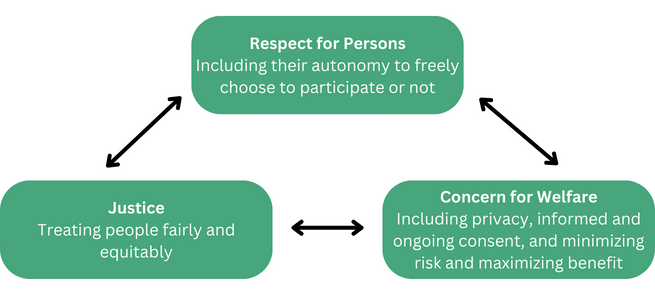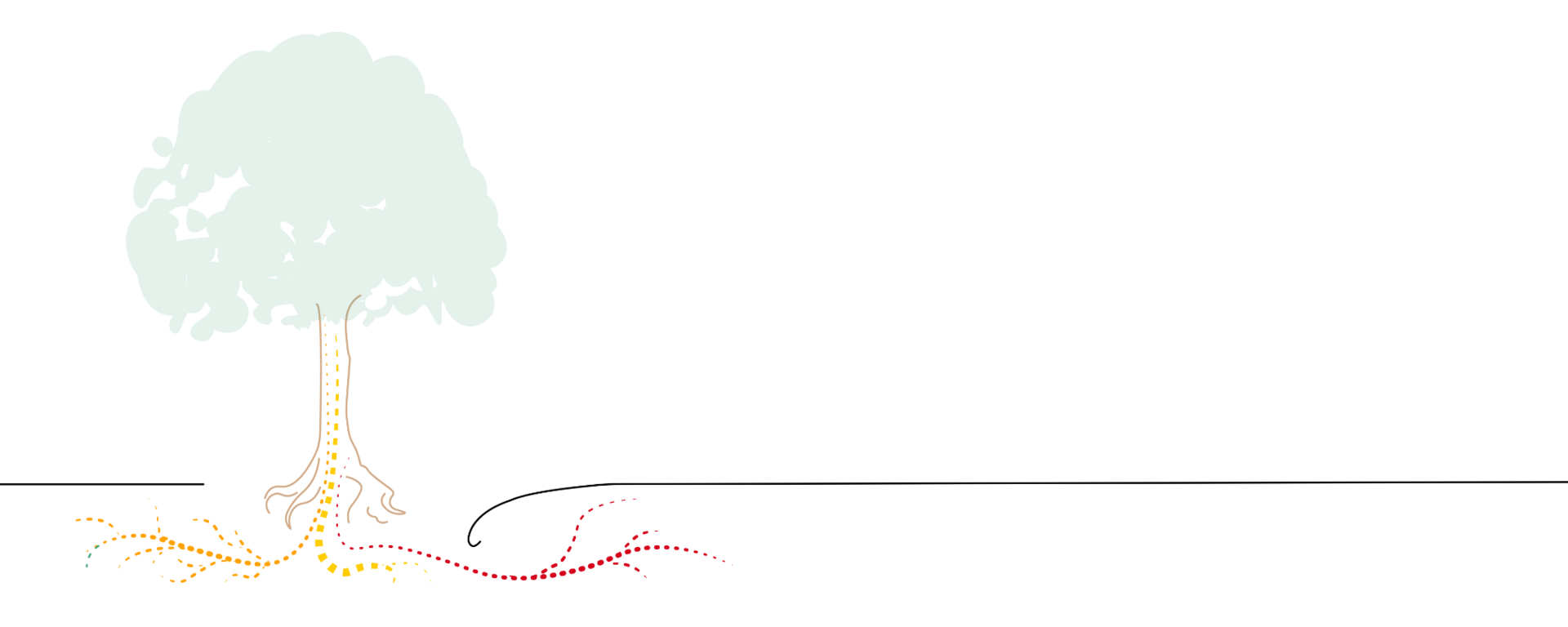Ethics is foundational to engaging in SoTL. An understanding of ethical considerations for SoTL is important for students, staff, faculty and administrators learning about and participating in SoTL projects.
In this lesson, you will have the opportunity to consider ethical challenges that will likely arise during each step of the SoTL process: research design, participant recruitment, data collection, analysis, writing, and dissemination. We will discuss how to build an ethical framework for your own SoTL practice and how to support others in conducting SoTL. We will also provide an overview of why and how to have your work reviewed by an ethics board.
Lesson checklist
- Demonstrate awareness of ethical responsibilities and considerations for SoTL work
- Consider multiple perspectives when reviewing or designing a SoTL project
- Cultivate a habit of continuous ethical reflexivity to respond to challenges that arise when conducting SoTL
An Ethical Framework for SoTL
The Canadian higher education community has committed to the Tri-Council Policy Statement, Ethical Conduct for Research Involving Humans (TCPS2). As scholars within Canada, we have agreed to follow its three complementary and interdependent principles in all of the work that we do involving humans: respect for persons, justice, and concern for welfare*.
*For scholars located outside of Canada, please research and review equivalent statements on ethical research involving humans in your area.

Figure 1: The Three Core Principles of TCPS2
Respect for Persons means valuing every individual and treating them with respect and consideration, whether they are research participants, or their biological materials are used. It is crucial to obtain informed, ongoing, and voluntary consent to uphold autonomy in research.
Concern for Welfare refers to an individual's overall well-being, including physical, mental, spiritual, economic, and social factors. To ensure well-being, participants must be informed of potential risks and benefits, allowing them to make informed decisions.
Justice requires treating everyone fairly and equally, with respect and care. Equity is important in distributing the benefits and drawbacks of participation without unfairly burdening any group. Fair and equitable treatment does not always mean treating people the same way. Differences in treatment or distribution may be necessary and justifiable to avoid creating or reinforcing inequities that arise from failing to consider differences among people.
This video emphasizes that good research is ethical research. Researchers rely on ethics to guide them along every step of the research process.
If you want to learn more about research ethics in general, explore this new comprehensive module, available to everyone at the University of Calgary. This self-paced resource is designed for flexible navigation, allowing you to focus on the most relevant aspects of your study, regardless of your prior knowledge or experience.
The module covers historical and Canadian contexts, provides expert insights, includes case studies, and offers supplementary resources to enhance your understanding and reflection.
Ethical Reflexivity
Ethical reflexivity: Thinking about your own and participant's attitudes, views, beliefs to consider the implications of scholarship, avoid harm, and ensure participants' rights through a project
As SoTL scholars, we bring multiple identities and roles into our practice (e.g., instructor, scholar, student, administrator, consultant, teaching assistant, coordinator, librarian). Ethical dilemmas often arise when an individual is faced with multiple responsibilities and sensitivities. For example, a single person may have responsibilities to their students, university, department, fellow researchers, participants in their research, the scientific community, and society at large. These responsibilities may not always align, and it can be challenging to fully comprehend the context and implications of multiple roles.
When planning and engaging in SoTL, it can be helpful to always consider benefits and risks through the eyes of participants, and from the perspective of your participants’ everyday experiences. SoTL can give rise to a range of ethical issues during each step in the project, so there is a need for ongoing ethical reflexivity throughout the process of SoTL.
In the following video, the dual role of researcher and teacher is discussed, highlighting the significance of ethical practices.
Activities
SoTL Ethical Principles and Challenges
Since SoTL involves educators, students, researchers, institutions and external partners, it is important for not only scholars to consider the ethical implications, but also potential participants, sponsors and the wider community. SoTL is strengthened when everyone is sensitive to the complex and sometimes unexpected ethical concerns that may arise.
We have outlined several considerations for ethical practice based on the participant’s experience in the project:
| Participants Experience | Considerations for Ethical Practice | Strategies |
| Recruitment & Participation | Consider and be sensitive to the inherent power differentials present in academic settings when choosing potential participants and determining your recruitment strategies. Be inclusive, fair, and equitable when selecting participants by recognizing and respecting the vulnerability of individuals or groups. Carefully consider who will be recruited and how, and who will not be included and why. Mitigate undue influence, coercion, or power imbalances by prioritizing students as learners/students first and not research participants. This is also important for other settings where research may be occuring in classroom, professional development, or work settings. | Get input from others to identify any blind spots regarding any influence, coercion and power imbalances in your project. Have a clear rationale for participant inclusion and exclusion criteria connected to your project’s goals and specific research questions. Consider your assumptions about potential participants to ensure that your inclusion/exclusion criteria do not suffer from blind spots. Use a third party for recruitment, consent, information provision, de-identification, data collection, and data analysis. In course settings, collect data from students after grades are submitted, and appeals are resolved. Provide participants with information on how to contact the university's REB for ethical concerns. |
| Informed Consent | Participants should be fully aware of what participation will entail, how they and their data will be treated. Participants should understand the purpose, benefits, risks, and consequences of the study before they are asked for consent. Participation should be voluntary. Ensure participants have the autonomy to freely and privately participate, refuse to participate, or withdraw from participation. Prior to participation, any concerns participants may have should be addressed. | Use a third party to facilitate consent/withdrawal processes to protect students’ privacy. For course-based studies, ensure consent is anonymous to all members of the course including other students, graduate teaching assistants, and the instructor. Clearly communicate to participants that there are no repercussions for their refusal to consent. In course-based projects, ensure that there is not a difference for students who participate or not in the study. When conducting surveys, use web-based survey tools (e.g., Qualtrics) that allow participants to participate anonymously. When offering incentives, keep them to a minimum to avoid undue influence (e.g., $25 bookstore gift card, a draw for a $50 gift card). |
| Data collection, storage, and sharing of findings | Protect the participants’ information privacy and the integrity of the project by meeting confidentiality obligations in the data collection and storage. Implement appropriate institutional safeguards and security measures to protect participant information and data. Consider the impact on participants of how, when, and where you share your findings. Ensure that participant identities are protected, unless specifically requested and consented to. Make the results available, accessible, and understandable to all participants upon completion of the study. | Discuss confidentiality with the research team and have them sign a confidentiality agreement if relevant. If information may be shared with government agencies or other partners during the study, inform participants beforehand. Use various techniques like aggregation, masking, anonymizing and using pseudonyms to de-identify data. Store collected data in secure and password-protected databases or systems. Ensure that research data is encrypted during transmission and storage. Limit access to only research team members.
|
Learning about FOIP & Ethics Review Process at the University of Calgary
SoTL practitioners at other post-secondary institutions are encouraged to review their institutional policies and procedures around freedom of information, ethics review and any training required.
FOIP
The University of Calgary, like other Canadian higher education institutions, follows Freedom of Information & Protection of Privacy (FOIP) Act.
- SoTL scholars are encouraged to complete the FOIP General Awareness in-person or online training prior to designing a SoTL study. Sign-up available: https://www.ucalgary.ca/legal-services/access-information-privacy
- All SoTL projects must follow legal and privacy policies. You can review guidelines and policies at https://www.ucalgary.ca/legal-services/access-information-privacy. Legal services provides consultations for questions specific to SoTL projects. Contact: foip@ucalgary.ca.
Ethics Review
The University of Calgary has two ethics boards that are responsible for reviewing research applications involving humans, their data, or human biological materials. The Conjoint Faculties Research Ethics Board (CFREB) and the Conjoint Health Research Ethics Board (CHREB) follow the guidelines set by the Tri-Council Policy Statement, Ethical Conduct for Research Involving Humans (TCPS2), which are based on three core complementary and interdependent principles: respect for persons, justice, and concern for welfare.
- SoTL scholars are encouraged to complete the TCPS 2: CORE-2022 (Course on Research Ethics) or CITI Human Subjects Research Course prior to designing or engaging in a SoTL project.
- Depending on the nature of the work and potential risks, SoTL projects may be considered exempt from ethics review or may require delegated or full board review. This decision is made by the University of Calgary Conjoint Ethics Review Board or the Conjoint Health Research Ethics Board depending on your home faculty. See Human Research Ethics | Research at UCalgary | University of Calgary for more information.
Depending on the intentions, scope, data collected, and plans for dissemination, many SoTL projects could be considered research, quality assurance (QA), or quality improvement (QI). As a result, projects will require different levels of ethics review (e.g., full board review, delegated review, or exempt from review). For more information, please see:
CHREB QA/QI/PE vs Research https://research.ucalgary.ca/sites/default/files/teams/2/Ethics/QA-QI-PE%20vs.%20Research%20Resource%20-%20Jan%2016%202024.pdf
For applicants to the CFREB, you can use this assessment tool to help determine what level of review your project will require, and to provide the information required for a letter of exemption.
For applicants to the CHREB, if you believe your project is exempt from board review, you can send an email with a brief description describing why that is the case.
Support Contacts:
Conjoint Faculties Research Ethics Board cfreb@ucalgary.ca
Conjoint Health Research Ethics Board chreb@ucalgary.ca
Additional Resources
This Policy expresses the Agencies' continuing commitment to the people of Canada to promote the ethical conduct of research involving humans. It has been informed, in part, by leading international ethics norms, all of which may help, in some measure, to guide Canadian researchers, in Canada and abroad, in the conduct of research involving humans.
This guide and book addresses issues related to ethics and the scholarship of teaching and learning, and pays special attention to ethical concerns and experiences that have arisen from engaging in Scholarship of Teaching and Learning (SoTL) work.
This resource introduces learners to the significance of positionality in research and helps them identify ways to remain aware of their positionality throughout the research process.
This resource introduces learners to strategies to remain aware of the positionality going into the research process.
References
Government of Canada, Interagency Advisory Panel on Research Ethics. (2023, January 11). Tri-council policy statement: Ethical conduct for research involving humans – TCPS 2 (2022). https://ethics.gc.ca/eng/policy-politique_tcps2-eptc2_2022.html
McGinn, M. K. (2018). Teaching and researching ethically: Guidance for instructor-researchers, educational developers, and research ethics personnel. The Canadian Journal for the Scholarship of Teaching and Learning, 9(1). https://doi.org/10.5206/cjsotl-rcacea.2018.1.2
Fedoruk, L. (2017). Ethics in the scholarship of teaching and learning: Key principles and strategies for ethical practice. Taylor Institute for Teaching and Learning Guide Series. Calgary, AB: Taylor Institute for Teaching and Learning at the University of Calgary. https://www.ucalgary.ca/taylorinstitute/guides
Pool, J., & Reitsma, G. (2017). Adhering to scientific and ethical criteria for scholarship of teaching and learning. Critical Studies in Teaching and Learning, 5(1), 36–48. https://doi.org/10.14426/cristal.v5i1.98
Society for Teaching and Learning in Higher Education. (n.d.). Ethical principles in university teaching. https://www.stlhe.ca/awards/3m-national-teaching-fellowships/initiatives/ethical-principles-in-university-teaching/




